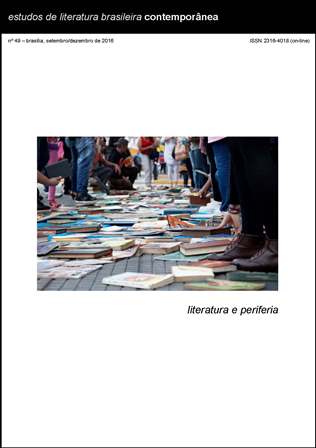Elizandra Souza:
escrita periférica em diálogo transatlântico
DOI:
https://doi.org/10.1590/2316-4018494Abstract
Neste artigo, discuto as conexões entre vida e obra de Elizandra Souza, escritora associada à produção literária da periferia de São Paulo, no âmbito das discussões teóricas sobre diáspora africana, pensamento negro feminista e pensamento descolonial latino-americano. Argumento que Elizandra parte de uma formação identitária espiralar/sampleada que atravessa e expande as páginas do livro na sua materialidade impressa para construir uma ponte entre música (hip-hop), literatura (Punga e Águas da cabaça) e tecnologia (Rádio Comunitária Heliópolis). Ao fazê-lo, Elizandra instaura uma presença política que rasura e contesta o imaginário sobre o morador da periferia como o sujeito modalizado pela falta. Defendo ainda que não é possível entender a obra de Elizandra, nem a atual periferia brasileira se não for levada em consideração uma multiplicidade de elementos, tais como: os mecanismos alternativos de comunicação comunitária, a cultura hip-hop e os saraus. Meu argumento final é de que seu livro Águas da cabaça desafia uma centralidade masculina que tem se tornado predominante nas narrativas da e sobre a periferia, ao mesmo tempo que aponta uma aliança transatlântica com outras escritoras da diáspora africana.
Downloads
References
BEJARANO, Cintia (2005). ¿Qué onda? Urban youth culture and border identity. Tucson: University of Arizona Press.
CASTRO, Sílvia Regina Lorenso (2007). Corpo e erotismo em Cadernos negros: a reconstrução semiótica da liberdade. Dissertação (Mestrado em Semiótica e Linguística Geral) ”“ Universidade de São Paulo, São Paulo.
CARCAMO-HUECHANTE, Luis E.; LEGNANI, Nicole Delia (2010). Voicing differences: indigenous and urban radio in Argentina, Chile, and Nigeria. In: SOMMER, Doris; SANÃN, Andrés. New directions for youth development. Danvers: Wiley Periodicals.
CARNEIRO, Sueli (2003). Mulheres em movimento. Estudos Avançados, São Paulo, v. 17, n. 49, p. 117-132, set./dez. Disponível em: <http://www.scielo.br/pdf/ea/v17n49/18400.pdf>. Acesso em: 26 jul. 2016.
COLE, Johnnetta B.; GUY-SHEFTALL, Beverly (2004). Gender talk: the struggle for women’s equality in African American communities. Nova York: Ballantine Books.
COLLINS, Patricia Hills (1990). Black feminist thought: knowledge, consciousness, and the politics of empowerment. Boston: Unwin Hyman.
COSTA, João Paulo (2013). As coloridas capulanas. Terras de Moçambique: recortes e impressões de um país. Maputo, 8 abr. Blogue. Disponível em: <https://terrasdemozambique.wordpress.com/2013/04/08/as-coloridascapulanas/>. Acesso em: 27 jul. 2016.
DALCASTAGNÈ, Regina (2005). A personagem do romance brasileiro contemporâneo (1990-2004). Estudos de Literatura Brasileira Contemporânea, Brasília, n. 26, p. 13-71, jul./dez. Disponível em: <http://periodicos.unb.br/index.php/estudos/article/view/2123/1687>. Acesso em: 27 jul. 2016.
GONZALEZ, Lélia (1988a). A categoria político-cultural de amefricanidade. Revista Tempo Brasileiro, Rio de Janeiro, n. 92/93, p. 69-82, jan.jun.
GONZALEZ, Lélia (1988b). Por un feminismo afrolatinoamericano. Revista Isis International, Santiago, v. 9, p. 133-141, jun.
MARTINS, Leda Maria (2000). A oralitura da memória. In: FONSECA, Maria Nazareth Soares. Brasil afro-brasileiro. Belo Horizonte: Autêntica.
MCCRACKEN, Pegue (2003). The curse of eve, the wound of the hero: blood, gender, and medieval literature. Pennsylvania: University of Pennsylvania Press. (The Middle Ages Series).
MIGNOLO, Walter (2012). Local histories/global desings: coloniality, subaltern knowledge, and border thinking. Princeton: Princeton University Press.
POUGH. Gwendolyn D. (2004). Check it while i wreck it: black womanhood, hiphop culture, and the public sphere. Boston: Northeastern University Press.
RIBEIRO, Esmeralda; BARBOSA, Márcio (2006). Cadernos negros 29 (Poesia). São Paulo: Quilombhoje.
SILVA, José Carlos Gomes da (2011). Sounds of youth in the metropolis: the different routes of hip hop movement in the city of São Paulo. Vibrant. Virtual Brazilian. Anthropology, Brasília, v. 8, n. 1, p. 70-94, jan./jun. Disponível em: <http://www.scielo.br/scielo.php?pid=S1809-43412011000100003&script=sci_arttext>. Acesso em: 27 jul. 2016.
SMITH, Linda Tuhiwai (1999). Decolonizing methodology: research and indigenous people. Sidney: Zed Books.
SOUSA, Neuza Santos (1983). Tornar-se negro: ou as vicissitudes da identidade do negro brasileiro em ascensão social. Rio de Janeiro: Graal.
SOUZA, Elizandra (2006). Eterno amor. In: RIBEIRO, Esmeralda; BARBOSA, Marcio (Org.). Cadernos negros: poemas brasileiros. São Paulo: Quilombhoje, 2006, v. 29, p. 13.
SOUZA, Elizandra (2010). Reportagem afetiva: meu déja vu. Blog Mjiba ”“ Jovem mulher revolucionária. 30 dez. On-line. Disponível em: <http://mjiba.blogspot.com.br/2010/10/reportagem-afetiva-meu-dejavu.html>. Acesso em: 27 jul. 2016.
SOUZA, Elizandra (2012a). Águas da cabaça. São Paulo: Edição do Autor
SOUZA, Elizandra (2012b). Conheça um pouco da poetisa Elizandra Souza. Entrevista para o site Polifonia Periférica. 27 out. On-line. Disponível em <http://www.polifoniaperiferica.com.br/2012/10/entrevista-conheca-umpouco-da-poetisa-elizandra-souza/>. Acesso em: 27 jul. 2016.
SOUZA, Elizandra; KINTÉ, Akins (2007). Punga. São Paulo: Toró.
TEREZA, Maria (2007). Negrices em flor. São Paulo: Toró.
WALSH, Catherine (2013). Pedagogías decoloniales: prácticas insurgentes de resistir, (re)existir y (re)vivir. Quito: Abya Yala.
Downloads
Published
How to Cite
Issue
Section
License
Authors who publish in this journal agree to the following terms:
a) The authors maintain the copyright and grant the journal the right of first publication, the work being simultaneously licensed under the Creative Commons Attribution License-Non Commercial 4.0 which allows the sharing of the work with acknowledgment of the authorship of the work and publication this journal.
b) Authors are authorized to enter into additional contracts separately, for non-exclusive distribution of the version of the work published in this journal (eg publish in institutional repository or as a book chapter), with authorship recognition and publication in this journal.
c) Authors are allowed and encouraged to publish and distribute their work online (eg in institutional repositories or on their personal page) after the editorial process, as this can generate productive changes, as well as increase the impact and citation of published work (See The Effect of Free Access).
d) The authors of the approved works authorize the magazine to, after publication, transfer its content for reproduction in content crawlers, virtual libraries and the like.
e) The authors assume that the texts submitted to the publication are of their original creation, being fully responsible for their content in the event of possible opposition by third parties.


